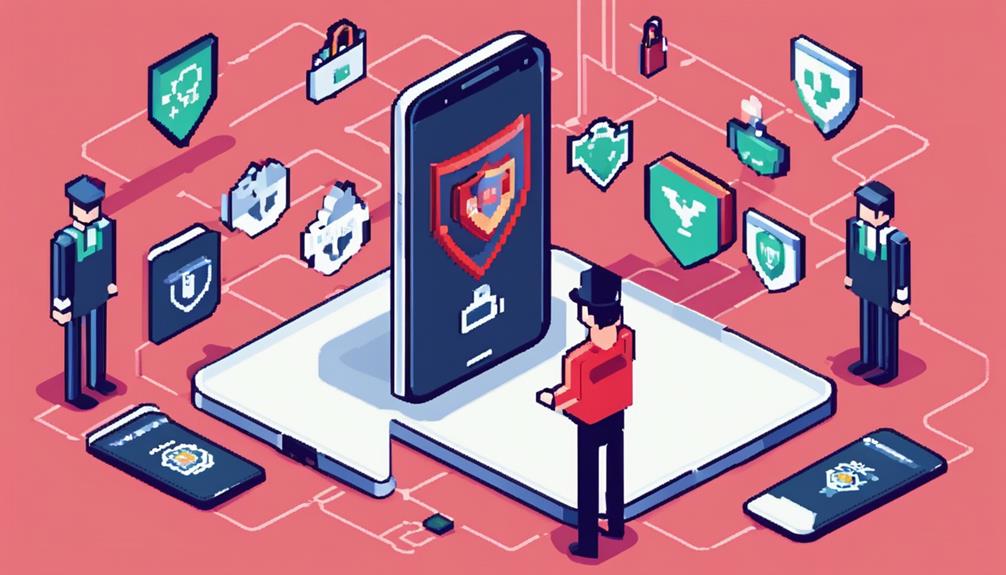To safeguard your phone's safety from hackers, watch for signs like rapid battery drain, unfamiliar logins, and unusual app installations. Protect against hacking by updating the OS, avoiding public Wi-Fi, and using strong passwords. Check for hacks if you notice fast battery depletion, strange apps, or high data usage. USSD codes can assist in phone security by identifying issues like call diversion. Antivirus software can help detect malware and protect against cyber threats. Stay vigilant about security updates and review app permissions regularly for enhanced protection. Pay attention to signs of a hacked phone camera and take preventive measures promptly.
Key Takeaways
- Monitor battery usage for sudden drains.
- Review app permissions for potential breaches.
- Check data usage for unusual spikes.
- Watch for strange pop-ups or notifications.
- Regularly update security software for protection.
Warning Signs of Phone Hacking
Identifying warning signs of phone hacking is vital in safeguarding your device and personal information from potential security breaches. Key indicators of phone hacking include rapid battery drain, unfamiliar logins, and decreased storage space on your phone.
Be cautious of your phone's performance, as slow response times, unusual app installations, and unrecognized calls could signal a compromised device. Monitoring for excessive data usage, strange pop-ups, and unusual activity on linked accounts is essential as these could indicate a security breach on your phone.
If you notice your phone overheating frequently or exhibiting abnormal behavior such as sluggishness or unexpected restarts, it may be a sign of hacking. Protect your phone by staying vigilant against phone hacking, checking your apps for any suspicious activity, and being mindful of any increased data usage that could point to a security threat.
Utilizing antivirus software and practicing good mobile security habits can help safeguard your device from malicious software and data access attempts.
Indicators of Compromised Phone Security

How can you recognize signs of compromised phone security to protect your device and personal information from potential threats?
There are several red flags that may indicate your phone's security has been compromised. If you notice your phone's battery draining quickly, overheating, or experiencing sluggish performance, it could be a sign of malicious activity.
Unusual activity on your accounts, weird pop-ups, increased data usage, and unfamiliar content in your gallery are also indicators of a compromised phone.
Monitoring your device for any suspicious apps, keeping an eye on text messages and call logs for anomalies, and paying attention to your phone's overall performance are essential steps to detect potential security breaches.
Mobile spyware may also cause these issues. By staying vigilant and proactive in safeguarding your phone, you can better protect your personal data and guarantee a secure mobile experience.
Steps to Prevent Phone Hacking

To enhance your phone's security and prevent hacking incidents, implementing proactive measures is paramount. Here are some steps you can take to safeguard your personal information and data:
- Regularly Update Your Phone's Operating System: Keeping your mobile software up to date helps protect against vulnerabilities that hackers can exploit.
- Avoid Public Wi-Fi Networks: Refrain from connecting to unsecured public Wi-Fi to prevent unauthorized access to your data.
- Use Strong Passwords and Two-Factor Authentication: Secure your accounts with unique, complex passwords and enable two-factor authentication for an extra layer of security.
- Download Apps from Trusted Sources: Be cautious when downloading apps and only install them from official app stores to avoid malicious software that could compromise your phone's security.
How to Check for Phone Hacks

Checking for signs of phone hacking involves monitoring various aspects of your device for any unusual activity that could indicate a security breach. To check if your phone has been hacked, look out for fast battery draining, unfamiliar apps, and high data usage that you haven't initiated.
Run anti-malware scans regularly to detect any malicious software that might have infiltrated your device. Keep an eye out for strange pop-ups, sluggish performance, and any abnormal behavior like overheating or unexpected logins, as these could be indications of a hacked phone.
If you notice your phone displaying unfamiliar behavior such as decreased storage or unrecognized calls, it's essential to investigate further. Additionally, be wary of any sudden changes in your phone's performance, such as a sudden drop in speed or responsiveness.
Using USSD Codes for Phone Security

Utilizing USSD codes enhances phone security by providing users with direct access to real-time communication and information retrieval on their devices. These codes, based on the GSM protocol, offer a way to interact with your phone without the internet.
Here are some ways USSD codes can help bolster your phone safety:
- IMEI Number Identification: Use codes like *#06# to match the unique IMEI number of your device, aiding in its identification.
- Checking for Phone Tapping: Dial specific USSD codes like *#*#4636#*#* to detect any unauthorized phone tapping activities.
- Identifying Call Diversion: USSD codes such as *#21# can assist in determining if your calls are being diverted, ensuring better security awareness.
- Real-Time Monitoring: These codes allow for immediate actions, enabling users to stay vigilant against potential hackers attempting to compromise their devices.
Can Antivirus Software Protect Your Phone?

In the domain of phone security, a significant consideration lies in the effectiveness of antivirus software in safeguarding your device from a myriad of cyber threats. Antivirus software plays a vital role in protecting your phone by detecting and removing malware, spyware, and other malicious threats that could compromise your personal information and data.
It offers real-time scanning capabilities to identify and block potential security risks before they can harm your device.
Regular updates to antivirus software are essential to enhance its effectiveness in defending your phone against evolving cyber threats. By providing additional security layers, antivirus software acts as a shield for your device, complementing measures like strong passwords, two-factor authentication, and cautious app downloads.
Tips for Phone Security in 2024

To prioritize regular security updates for your device's operating system and applications is essential for phone security in 2024.
Additionally, conducting periodic checks on app permissions can help prevent unauthorized access to sensitive information.
Security Updates Importance
Regular security updates play a critical role in safeguarding your phone from cyber threats and enhancing its overall security in 2024. Neglecting these updates exposes your device to vulnerabilities that hackers exploit, leading to potential malware infections and compromised phone security.
Key points to keep in mind include:
- 60% of successful cyberattacks target unpatched vulnerabilities, highlighting the importance of timely security updates.
- 85% of targeted attacks can be prevented through regular updates, greatly enhancing overall phone security.
- 40% of Android users use outdated software, leaving their devices at risk due to delayed updates.
- Hackers actively exploit unpatched systems, emphasizing the need for staying up to date with security patches to mitigate known security flaws.
App Permissions Check
Managing app permissions on your smartphone is an essential step in enhancing data privacy and maintaining phone security in 2024. For Android phones, it is important to regularly review and adjust app permissions to limit access to personal data. Uninstalling unused apps and removing unnecessary permissions can greatly enhance overall phone security.
Similarly, iPhone users should pay close attention to managing third-party apps connected to their Apple ID to safeguard data privacy.
To guarantee maximum security, it is important to stay vigilant and regularly check and update app permissions. By proactively monitoring app permissions, you can prevent unauthorized access to sensitive information and protect your personal data effectively.
Signs of a Hacked Phone Camera

Indications of a compromised phone camera include unexplained activities such as turning on autonomously, overheating, or draining the battery unusually when the camera is not in use. If you notice any of these signs, your device might be at risk of unauthorized access or surveillance.
To help you identify if your phone camera has been hacked, watch out for the following:
- Unresponsive touch input when attempting to use the camera
- Increased data usage without a known reason
- Strange noises or visual glitches during camera usage
- Hacking attempts leading to unusual camera behavior
Being vigilant about these signs can help you detect potential security breaches and protect your privacy. If you suspect that your phone camera has been compromised, take immediate action to secure your device and data.
Frequently Asked Questions
Can You Tell if Someone Has Access to Your Phone?
To determine if someone has access to your phone, monitor for unexplained data usage spikes, unfamiliar apps, and unusual battery drain. Check for unexpected changes in contacts, messages, and settings. Watch for strange behavior like random reboots or apps opening autonomously.
What Is the Code to Check if Your Phone Is Being Monitored?
To determine if your phone is being monitored, dial *#06# to check the IMEI number, *#*#4636#*#* to detect phone tapping, *#062# for call redirection, *#21# for call diversions, and ##002# to stop unauthorized monitoring.
Can Hackers See You Through Your Phone Camera?
Hackers can potentially gain unauthorized access to your phone camera, enabling them to monitor you without your knowledge. Look out for indications like unexplained overheating, increased data usage, or unexpected camera activations, which could suggest camera surveillance.
Can You Remove a Hacker From Your Phone?
Addressing phone hacking involves running security scans, seeking professional help, and taking swift action. Safeguarding personal data is essential for phone security. Proactive measures, such as staying informed on potential threats, can aid in identifying and removing hackers effectively.
Conclusion
In summary, ensuring the security of your phone is vital in today's digital age. By being aware of warning signs, regularly checking for hacks, and implementing strong security measures, you can protect your device from potential threats.
Just like locking your front door to keep intruders out, safeguarding your phone from hackers is essential to safeguard your personal information and privacy.
Stay vigilant and proactive in maintaining your phone's security to prevent unauthorized access.









